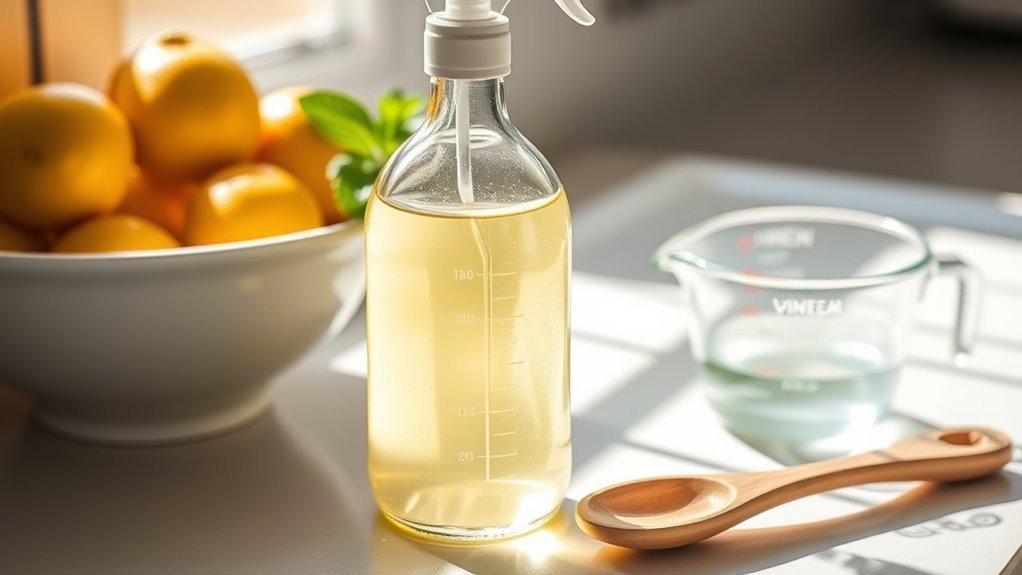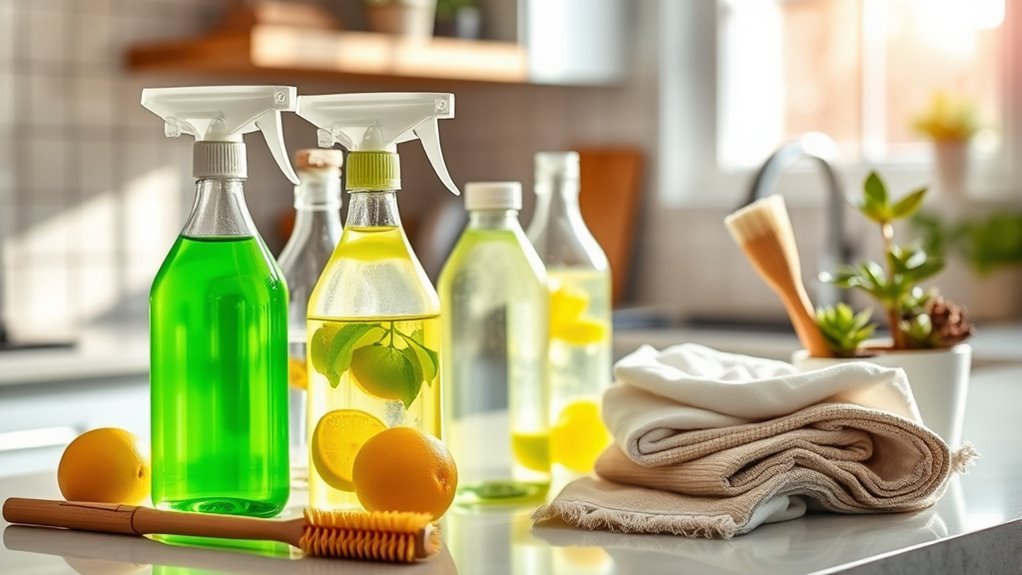Budget-Friendly DIY Cleaning Products for Fan
You can easily clean your fan on a budget using simple DIY products like a vinegar and water spray to cut grime, or a baking soda paste for tougher dirt. Lemon juice works great as a natural degreaser, while mild soap solutions help with regular dusting. Always unplug the fan, use soft cloths, and dry thoroughly to keep it safe. If you want tips on making these cleaners and storing them properly, there’s plenty more to explore.
Benefits of Using Homemade Cleaning Solutions

Although commercial cleaners are convenient, homemade cleaning solutions offer distinct benefits that might make you reconsider your cleaning routine. By opting for eco friendly alternatives, you reduce your environmental impact without sacrificing effectiveness. These DIY options avoid harsh chemicals, creating a safer space for you and your family. Plus, they’re incredibly cost effective solutions—ingredients like vinegar, baking soda, and lemon juice are inexpensive and versatile, letting you clean multiple surfaces with just a few staples. Making your own cleaners gives you the freedom to control what goes into your products, tailoring them to your specific needs and preferences. This practical approach not only saves money but also empowers you to maintain a cleaner, greener home without relying on costly, commercial formulas.
Essential Ingredients for DIY Fan Cleaners
A few key ingredients can make all the difference when you’re creating DIY cleaners for your fans. To keep things eco friendly, start with white vinegar—its natural acidity cuts through grime without harsh chemicals. Baking soda is another cost effective solution that helps remove stubborn dust and odors. A few drops of essential oils like lemon or tea tree add a fresh scent and boost cleaning power. For tougher grease, mild liquid castile soap blends well with water for gentle yet effective cleaning. These simple, readily available ingredients let you avoid expensive, chemical-laden products while maintaining your freedom to customize your cleaner. By combining these elements, you create a practical, affordable fan cleaner that’s safe for your home and the environment.
How to Make a Vinegar and Water Cleaning Spray

To make an effective vinegar and water cleaning spray, you’ll want to mix one part vinegar with one part water for general use. This ratio works well on most surfaces, but you can adjust it depending on how tough the grime is. Spray it on, let it sit a few minutes, then wipe clean to tackle everything from countertops to glass.
Vinegar-to-Water Ratio
Mixing vinegar and water in the right ratio is key to creating an effective cleaning spray that’s safe for most surfaces. Depending on the vinegar types you choose—white distilled or apple cider—the cleaning ratios adjust to balance strength and safety. Here’s a quick guide to help you tailor your mixture:
| Vinegar Type | Recommended Ratio (Vinegar:Water) |
|---|---|
| White Distilled | 1:1 |
| White Distilled | 1:3 (for delicate surfaces) |
| Apple Cider | 1:1 |
| Apple Cider | 1:3 (for light cleaning) |
| Cleaning Strength | Adjust based on surface & task |
This flexibility gives you freedom to customize your spray’s potency, ensuring effective cleaning without damage.
Application Tips and Uses
Since you’ve already chosen the right vinegar-to-water ratio, knowing how to apply your cleaning spray effectively can make all the difference. Start by lightly misting the fan blades and grill, avoiding excess moisture that could harm electrical parts. Use a soft cloth or microfiber towel to gently wipe away dust and grime, following fan cleaning techniques that protect delicate surfaces. For tougher spots, spray directly onto the cloth instead of the fan to prevent drips. This eco friendly alternative not only cleans efficiently but also reduces chemical exposure. Remember to unplug the fan before cleaning and allow surfaces to dry fully before use. By mastering these application tips and uses, you maintain your fan’s performance and enjoy a healthier, chemical-free environment effortlessly.
Using Baking Soda Paste for Stubborn Fan Dirt
Although stubborn fan dirt can be tough to remove, using a baking soda paste offers a simple and effective solution. You just need to mix baking soda with a little water until it forms a spreadable paste. This natural abrasive gently lifts grime without damaging surfaces.
Stubborn fan dirt lifts easily with a gentle baking soda paste—simple, natural, and surface-safe cleaning.
Here’s how to use baking soda paste for cleaning fan dirt:
- Apply the paste directly onto dirty areas.
- Let it sit for 10–15 minutes to break down stubborn dirt.
- Use a soft brush or cloth to scrub gently.
- Wipe away residue with a damp cloth.
- Dry the fan parts thoroughly before reassembling.
This method saves money and lets you tackle fan cleaning with freedom from harsh chemicals, making your space fresher and your fan running smoothly.
Lemon Juice as a Natural Degreaser for Fans

Lemon juice is a powerful natural degreaser that cuts through grime without harsh chemicals, making it perfect for cleaning your fan blades. To use it, mix lemon juice with a bit of water, apply with a soft cloth, and wipe down each blade carefully to avoid drips into the motor. This method not only removes grease effectively but also leaves a fresh, clean scent behind.
Lemon Juice Benefits
A natural degreaser like lemon juice can make cleaning your fans much easier and more effective. Lemon juice’s natural antibacterial properties help eliminate germs while cutting through stubborn grease without harsh chemicals. When you use it, you get a safe, eco-friendly solution that’s gentle on surfaces yet tough on grime. Here’s why lemon juice is a smart choice for your fan maintenance:
- Naturally breaks down grease and dirt
- Acts as a natural antibacterial agent
- Leaves a fresh, pleasant scent
- Safe for most fan materials
- Inexpensive and easy to find
Application Tips for Fans
When you’re ready to clean your fans, mixing lemon juice with water creates an effective, gentle solution that tackles grease without damaging the surfaces. This natural degreaser is perfect for regular fan maintenance, helping extend your fan’s life and performance. Keep your cleaning frequency to every 1-2 months to prevent buildup. Use a soft cloth dipped in the lemon-water mix to wipe blades and vents, avoiding electrical parts. Here’s a quick guide:
| Step | Details |
|---|---|
| Prepare Solution | Mix equal parts lemon juice & water |
| Application | Dip cloth, wring out excess liquid |
| Cleaning Method | Wipe blades, grill, and motor housing |
| Drying | Air dry or wipe with dry cloth |
Stick to this routine and enjoy a fresh, efficient fan without harsh chemicals.
Crafting a Mild Soap Solution for Regular Cleaning
Since harsh chemicals can damage surfaces or irritate your skin, crafting a mild soap solution is a smart choice for regular cleaning tasks. This approach lets you maintain your fan without compromising safety or finish. Here’s how to make an effective, gentle cleaner using soap alternatives:
- Mix a few drops of castile soap with warm water.
- Add a teaspoon of white vinegar to boost cleaning power.
- Stir in a few drops of essential oil for a pleasant scent.
- Use a soft cloth or sponge dipped in the solution for wiping fan blades.
- Rinse with a damp cloth to remove residue and prevent buildup.
Adjust your cleaning frequency based on dust levels—weekly or biweekly works well. This mild solution keeps your fan fresh while respecting your freedom to choose safe, budget-friendly products.
Alcohol-Based Cleaner for Quick Fan Maintenance
If you need a faster way to clean your fan without leaving residue, an alcohol-based cleaner can be a great option. The alcohol properties allow it to evaporate quickly, preventing moisture buildup and streaks on fan blades and grills. To make your own, mix equal parts of isopropyl alcohol and water in a spray bottle. This solution cuts through dust and grime efficiently, making fan maintenance hassle-free. Just spray lightly and wipe with a microfiber cloth for a streak-free finish. Because alcohol evaporates rapidly, you won’t have to wait long before using your fan again. This method saves you time and keeps your fan running smoothly, letting you enjoy fresh airflow without fuss or costly commercial cleaners.
Tips for Safe and Effective Fan Cleaning
Although cleaning a fan might seem straightforward, following safety precautions and effective techniques guarantees both your well-being and the longevity of your appliance. To keep your fan running smoothly and safely, consider these practical tips:
- Always unplug your fan before starting any cleaning to avoid electrical hazards.
- Use a soft cloth or brush to gently remove dust without damaging blades or grilles.
- Maintain a regular cleaning frequency—ideally every few weeks—to prevent buildup.
- Avoid harsh chemicals; opt for mild DIY cleaners to protect fan components.
- Verify all parts are completely dry before reassembling and powering on the fan.
Storing and Handling Your DIY Cleaning Products
When you make your own cleaning products, proper storage and handling are key to keeping them effective and safe. Always label your containers clearly with ingredients and dates to avoid confusion. Use airtight bottles or spray containers to prevent contamination and evaporation. Store your DIY cleaners in a cool, dry place away from direct sunlight to maintain their potency. For safe handling, keep them out of reach of children and pets. Avoid mixing different products unless you’re sure they’re compatible, as this can cause dangerous reactions. When using your DIY cleaners, wear gloves if you have sensitive skin and ventilate the area to avoid inhaling fumes. By following these straightforward steps, you guarantee your cleaning products remain reliable and you stay free from unnecessary risks.
Frequently Asked Questions
Can DIY Fan Cleaners Damage Fan Blades or Motors?
You might worry if DIY fan cleaners can damage fan blades or motors. The key is in the cleaning product ingredients—avoid harsh chemicals like ammonia or bleach that can degrade materials or seep into motors. Stick to gentle solutions like diluted vinegar or mild soap. Following fan maintenance tips, always unplug the fan and avoid excessive moisture near the motor. This way, you keep your fan running smoothly without risking damage while enjoying your freedom to clean affordably.
How Often Should I Clean My Fan With Homemade Products?
Oh sure, wait until your fan’s spinning dust bunnies start forming a rebellion! For your fan maintenance tips, aim to clean it every one to two weeks if you use it daily. Dust and grime love to sneak into blades and motors, so regular cleaning frequency keeps your fan efficient and your air fresher. Use gentle homemade solutions and soft cloths—your fan deserves freedom from gunk without any harsh chemical tyranny.
Are These DIY Cleaning Products Safe for All Fan Types?
You’ll find that DIY cleaning products are generally safe for most fan types, but it’s smart to tailor your cleaning methods. For plastic or metal blades, mild soapy water works well, but avoid soaking electrical parts. For wooden blades, use a damp cloth with gentle cleaners to prevent damage. Always unplug your fan before cleaning, and test a small area first. This way, you keep your fan fresh without risking harm.
Can I Use Essential Oils in My Fan Cleaning Solutions?
Imagine your fan whispering fresh breezes infused with nature’s essence—that’s the magic of essential oils! You can definitely include essential oils in your fan cleaning recipes to harness their benefits like antibacterial properties and pleasant aromas. Just mix a few drops with water and mild soap, avoiding oil buildup on fan parts. This way, you keep your fan clean, fresh, and running smoothly, giving you the freedom to enjoy cool, fragrant air effortlessly.
What Should I Do if My Fan Still Smells After Cleaning?
If your fan still smells after cleaning, it’s likely due to lingering dust, mold, or trapped moisture—common fan odor causes. Start by dismantling the fan to clean hidden parts thoroughly. Use a mixture of vinegar and water to wipe blades and vents. Fan maintenance tips include regularly cleaning and ensuring it’s completely dry before reassembling. You might also want to check the motor for any buildup or wear that could cause odors.






